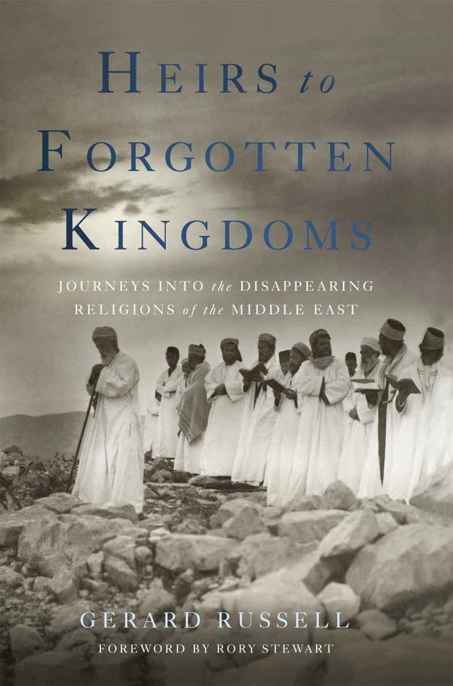
Heirs to Forgotten Kingdoms
Journeys Into the Disappearing Religions of the Middle East
- اطلاعات
- نقد و بررسی
- دیدگاه کاربران
نقد و بررسی

Starred review from October 20, 2014
This fascinating account of minority religions in the Middle East, many of which are threatened by increasingly turbulent political situations, is part travelogue and part scholarly overview. Russell, a former British diplomat in the region, uses his connections and experience as he travels in Syria, Lebanon, Iran, Iraq, Egypt, and several other places to meet members of religious minorities such as the Druze, the Copts, the Mandaeans, and the Samaritans, and to study their history and traditions. He outlines basic facts and beliefs in addition to showing resonances and similarities between the religious cultures. By tying modern practice to historical context, Russell provides a valuable briefing on the ancient and medieval history of the region. He also muses on the immediate future of each community, particularly with respect to political instability and immigration, and his cheerfully personal tone makes all this information lively. This important and enjoyable glimpse into little-considered religious dynamics of the Middle East deserves to be widely read and distributed.

October 1, 2014
Rare glimpses inside isolated pockets of ancient settlements in the Middle East, revealing fragile yet tenacious religions. During his years in the British foreign service in Iraq, Iran and Lebanon over the course of the 2000s, peripatetic British diplomat Russell visited many of these remote peoples, studying their vibrant religions-e.g., the Ezidis of northern Iraq, who experience persecution to this day. A speaker of Arabic and Farsi, he was especially attuned to the nuances of history and sensitive to the particular vulnerabilities of each group. Though not a scholar, he makes erudite assertions regarding these "intellectual cousins in unexpected places," who share with us Indo-European roots and have been preserved due to their remoteness or usefulness to the reigning political forces. Some of the religions are ancient offshoots of the three Abrahamic religions ("people of the book") and have retained a more "pure" form. The Mandaeans of Babylonian Iraq claim descent from the son of Adam, Seth, and revere John the Baptist as the greatest prophet. The Samaritans of the West Bank, Palestine, are cherished as a lost tribe of Israel that has been "keeping to the letter" of ancient traditions that the Jews abandoned-e.g., revering Mount Gerizim as God's sacred mountain. The descendants of those first converts by Mark the evangelist in Egypt in the first century are still thriving as Copts. The highly secretive Ezidis, though they speak the same language as the Kurds, Kurmanji, are not Kurds but share some tenets of Christianity and Islam and believe in reincarnation and the earthly manifestation of Melek Taoos, in the form of a peacock. Russell penetrates the secret workings of these religions tolerated throughout the ages by Christian or Islamic rulers, even pursuing his research to immigrant churches in Dearborn, Michigan. A pertinent work of history and journalism. As armies again march in the Middle East, these communities are at new risk.
COPYRIGHT(2014) Kirkus Reviews, ALL RIGHTS RESERVED.

October 1, 2014
Russell (coauthor, Paktika Provincial Handbook) has lived and traveled throughout the Middle East for more than a decade, working at British embassies in Baghdad and Kabul. His work led him to explore remote areas of Iraq and Afghanistan, among other countries, observing religious rituals and interviewing practitioners of small sects, curious about what has enabled them to survive for thousands of years in spite of isolation and persecution. The author is fluent in both Arabic and Farsi and his mostly solitary travels brought him to seek Zoroastrians in Iran, Kalasha in Pakistan, and Copts in Egypt, as well as Ezidis, Mandaeans, and Druze in Syria and Iraq. Russell succeeds in creating a rich, humanistic study highlighting cultural diversity and historical continuity and change. While he describes the theology of the groups, he is more interested in the creative ways they have explained the universe and defined their communities. The author regrets the harsh aspects of modernization and the growing intolerance in the Middle East that may result in the dispersion or extinction of these believers. VERDICT A fascinating and gracefully written study of minority religions, recommended for its appreciation of cultural richness and variety. Russell's portrayal of religious creativity both past and present contrasts, sadly, with the brutality and chaos in current headlines.--Elizabeth Hayford, formerly with Associated Coll. of the Midwest, Evanston, IL
Copyright 2014 Library Journal, LLC Used with permission.

November 15, 2014
Copts, Mandeans, Zoroastrians, Samaritans, Druzethese ancient groups, among others even less well known, were once vibrant religions whose believers worshiped alongside (or, in many cases, fought against) Judaism, Christianity, and Islam. Sometimes sects of these larger groups, they have one thing in common: as their numbers dwindle due to war and absorption, the tenets of their faiths could soon be lost. Russell, a former British and UN diplomat who lived in the Middle East for 15 years, proves an excellent tour guide as he introduces the remnants of these near-extinct groups. To do his research, Russell traveled into some of the most dangerous parts of the world, often interacting with those not particularly friendly to outsiders. He introduces beliefs, rituals, and age-old religious feuds, and he brings these religions into the modern world as he meets with practitioners now living in the West. Sometimes the narrative is tangled in detail, but this mostly makes for a fascinating read, especially when it becomes clear that, with a few twists of history, some of these religions would have been at the top, not the bottom.(Reprinted with permission of Booklist, copyright 2014, American Library Association.)




دیدگاه کاربران